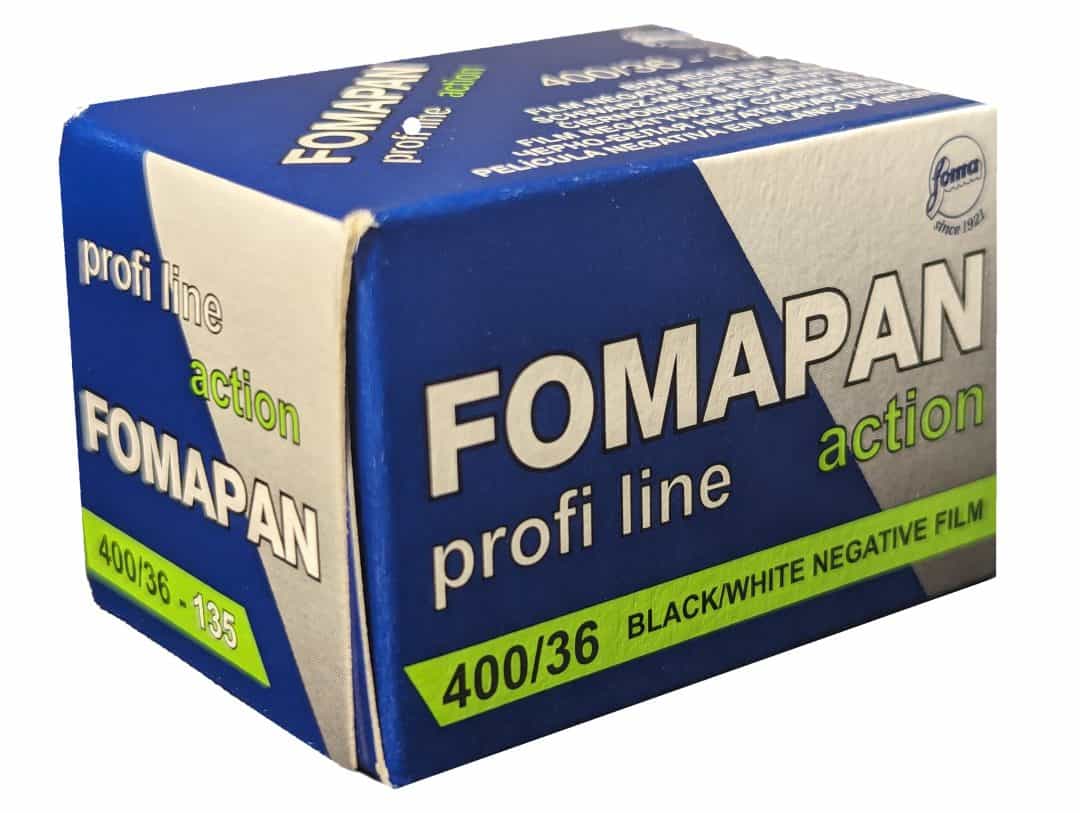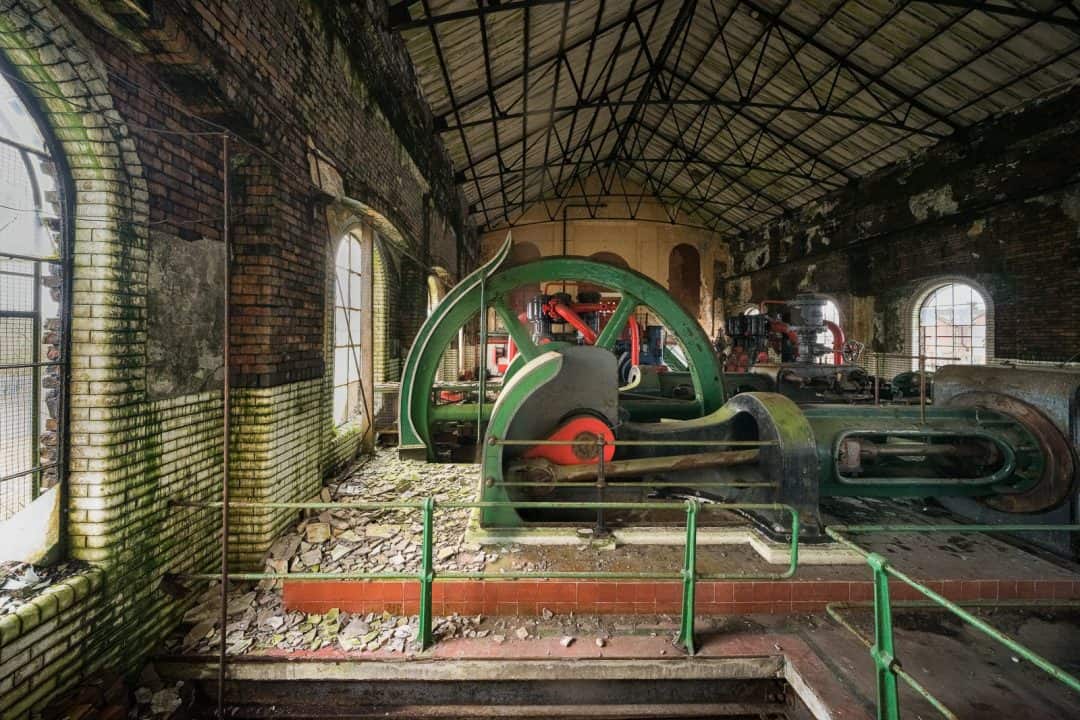Support me on Patreon for early access previews, rewards and giveaways!
Contact Me
Or use the contact form below.
Support me on Patreon for early access previews, rewards and giveaways!
Or use the contact form below.
Fomapan Action 400 is a medium-speed black and white film, ideal for capturing images in low-light conditions or freezing fast-moving subjects. It is a robust choice for sports and action photography, as referenced in its name! The film has a low to medium contrast look with very strong gain. One distinctive feature of this film, is that highlights often glow due to halation within the film.
The film is rated at ISO 400 but can be pushed far beyond box speed. It is (reportedly) capable of delivering all the way up to ISO 3200, as long as you are happy to embrace the grainy nature.
The film meets high requirements for low granularity, good resolving power and good contour sharpness. FOMAPAN 400 Action has a nominal speed rating of ISO 400/270, but due to its wide exposure latitude the film gives good results even when overexposed by 1 EV (exposure value) (as ISO 200/240) or underexposed by 2 EV (as ISO 1600/330) without any change in processing, i.e. without lengthening the development time or increasing the temperature of the
foma.cz
developer used.
| Type | BW | Price | Budget |
| Brand | Foma | Contrast | Medium |
| ISO | 400 | Shadow Detail | Low/Medium |
| Format | 35mm | Grain | High |

Pros
Cons
Foma Bohemia, Foma for short, is a film manufacturer based in Czechia. For certain, “Foma” doesn’t carry the same brand recognition as the well-known brands (I am looking at you Kodak, Ilford, Fuji or even Rollei films lurking in the corner!) Despite this, Foma has a long and rich history of producing film, paper, and chemistry since 1921!
Fomapan Action 400 is the fastest emulsion produced by Foma, with its close relatives Fomapan Classic 100, Fomapan Creative 200, and Retropan 320. One of its most distinctive (and commented on) features is its grain. Certainly, this is one grainy film! To put this into perspective, the datasheet rates it at an RMS Granularity of 17.5. Even higher than Kodak Tri-X, which is rated at 17 as a comparison. On top of the size of the grain, the type of grain is worth noting. The emulsion has a very “old school” tabular grain structure, a real throwback. Secondly, thanks to some quirks of the anti-halation layer, highlights often glow brilliantly!
A lesser-known fun fact, apparently, is that this film has near-infrared sensitivity. By attaching an IR 720nm filter and underexposing it by 6 to 8 stops, you can experiment with this film to produce some interesting photos! Conversely, the film has quite low sensitivity to blue and green.

This roll languished in my fridge for a few months before I finally loaded it up in my camera. As it is a budget black and white film, I decided not to take it on an exciting trip abroad.
Instead, I opted to shoot some pretty cool abandoned locations in northern England. Add in a little day trip to South Wales, and the roll was filled relatively quickly. I had a few trips to one of my favourite locations, a big abandoned colliery, as an added bonus. Shooting the old machinery in black and white was a lot of fun. Rendering the colourful machines in monochrome tones, creating simple images that focus on shape and the interplay of light/shadow.
These shots were lab developed, at box speed, back in the days before I developed my own film at home. In the future, I might re-shoot this film, to experiment to see if I can consistently reduce the grain. From reading online, if I overexpose by 1-2 stops and then compensate with a shorter development time, I can achieve a less grainy look. However, this will reduce the contrast as well. My biggest aesthetic issue (more so than the grain) is that this film stock looks a little flat for my tastes. Of course, it does not help that I shoot interiors away from glorious contrast-inducing sunshine. On balance, I think I should just continue experimenting with more film stocks (and writing more of these review articles!).
The photos are often softer in brightly lit situations, and can produce a highlight glow where bright areas are adjacent to darker areas (thank you, quirky anti-halation layer). I can certainly see this around bright windows, where I shot dimly lit interiors, which are of course a staple of abandoned places photography. This isn’t really a plus or a negative in my eyes; a bright window is always something I have to be aware of in my shooting.
And now, to the photos! I shot this roll of film in the summer of 2023, making a visit to one of my favourite local spots as well as some trips to Wales and around Manchester. Enjoy!
What photograph caught your eye the most? How did this location make you feel? Do you have a question? Let me know by leaving a comment!
I add new content every week, ranging from exciting new locations to blog articles about my road trips. My beautiful newsletter will bring my photographic adventures direct to your inbox!
Your email address will not be shared, or publically displayed. I will only use your data to send you the newsletter, as outlined in the Privacy Policy. You can unsubscribe at any time, via the opt-out link included in every email.
1 - Please do not ask for location addresses, see FAQ.
2 - Your email address will not be shared, or publically displayed. I will only use your data to reply to your message, as outlined in the Privacy Policy
When I retired, I looked at budget films to replace the ever more expensive Kodak TriX. I enjoy doing my own darkroom work. I choose to try Foma 400. To be honest, it is the worst film I ever used. First, it is a not a true 400 ISO. Maybe 200 ISO on a good day but in my experience it is closer to 160 ISO. I was really frustrated. Besides the “iffy” film speed, the film was very fragile and scratched if you looked at it the wrong way. No matter what I did in the final wash, such as, distilled water and a wetting agent, the film dried with huge water marks. I emailed Foma to complain. They admitted that the box speed was inflated but everything else was my fault because I used D76 developer, even though D76 was listed in their material as a developer. Thankfully, I finally ran out the 100 foot roll and I bought a 100 foot roll of Kentmere 400. What a difference! Photography was fun again and not a chore. First, Kentmere 400 is a true 400 ISO film. It dries better and I personally like the contrast better and it doesn’t have that annoying halation glow that Foma 400 has. Perhaps others have had better experience with Foma 400 but mine was pretty negative, pun intended!
Greetings! I can see why you were drawn to Fomapan 400, as it’s a thrifty option for bulk loading. I also tried this stock for a budget option, to compare with other films. Looking at my photos again, I agree it doesn’t appear to be generally darker/lacking shadow detail with my usual metering techniques, so some more evidence maybe it isn’t “true” ISO 400. I must say I didn’t have issues with drying and watermarks, just using standard Photoflo here.
Definitely with you, I would personally pick Kentmere 400 which
a) works great at box, or even pushed to ISO 1600 I haved had amazing results
b) has “nicer” looking grain, in my opinion
c) retains the highlight details better, and, as you say, doesn’t have the halation glow (likewise, I am not a fan)